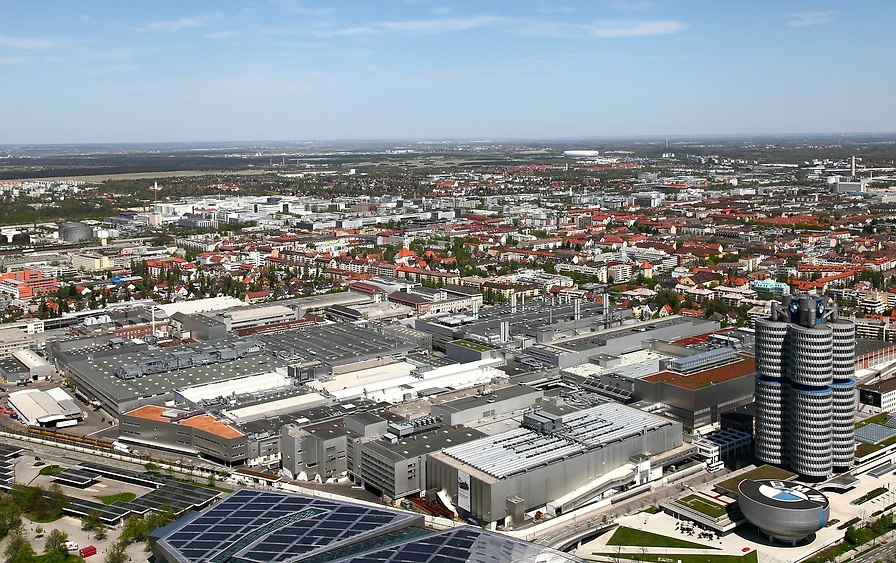AI with Purpose Summit 2023 Day 1

As the first day of the AI with Purpose Summit 2023 draws to a close in Munich, Germany, I’m excited to share some of my impressions of the conference. The summit takes place at the beautiful Munich Urban Collab located in the heart of the city with two floors of space dedicated to not only showcase the latest in industrial grade AI but also connect the some of the best and brightest in the AI space to spur further innovation.
The summit offers three main formats to engage with: speaker tracks, startup booths, and pitch sessions from those same startups. There are four speaker tracks in total each with a focus on a different major theme or challenge facing the AI industry. Unfortunately, as a single person I was only able to attend a few of these offerings – each hosted by an AI expert from Siemens or one of their partners.
To start off the day, I attended a talk on AI Market Trends hosted by Knud Lasse Lueth the founder of IoT Analytics which examined key KPI for growth and advancement identified within companies and how AI can play a role in each one of them. At the same time major trends were also highlighted, the four being the integration of AI accelerators in automation hardware (such as PLCs), the growth of synthetic data, emerging AI regulation, and an increasing focus on data management. Near the end, Knud also touched on the idea of how companies from different cultures and countries view industrial AI differently. For example, he notes how in Japan, the goal with AI in factories is complete autonomous operation with the AI controlling everything while for many western companies the idea of handing complete control over to an algorithm is deemed an unacceptable risk.
While I attended many fascinating discussions, one of the ones which most stood out to me was a discussion on whether Generative AI could build machines. Hosted by Dr. Jan R. Sayer of FESTO, this talk sought to not only define what a machine is but determine if an AI could build one – all in a short 30-minute session.
First, he defined machines as either Designing a System or Programming of a System. When designing a system, the inputs are a task to complete, the environment the machine will operate in and the available components to use. In this case, he shows that current AI systems are already capable of finding not just any, but the best design to solve a given problem. With this definition the answer is yes, AI can build a machine. However, this is not the only definition to consider.
Using the second definition he gave the problem becomes far more difficult. In this case the only inputs are the requirements or task, and the environment. The AI must not only find the best way to solve a problem but design the components it needs for the task as well. Using the example of a pneumatic piston, a fairly simple mechanical part, Jan shows how recent advances in Generative AI, such as ChatGPT 4.0, are able to generate reasonable CAD models when asked for a pneumatic piston model. These models still lack physics simulation however and cannot be considered true mechanical models yet, but Jan is confident that the first AI-generated physics simulations for CAD models will appear within the next 2-3 years.
The ability to create, from scratch, fully functional mechanical designs based on simple requirements is currently outside the realm of what AI can do, Dr. Jan believes this will change however and in the not too distant future this will be something AI is capable of. To round out his talk, he showed an example of an AI taking only a picture of a car as an input and generating a 3D mesh of the car with working lights, steering, and driving capabilities within a virtual environment, offering a glimpse of what is to come for AI-powered design systems.
The AI with Purpose Summit 2023 will continue for another day as will my coverage of the events there. Also stay tuned for my upcoming blogs covering the exciting and innovative work done by the many startups who are present, each showcasing the latest ways in which industrial grade AI is helping enrich the industrial world.
Siemens Digital Industries Software helps organizations of all sizes digitally transform using software, hardware and services from the Siemens Xcelerator business platform. Siemens’ software and the comprehensive digital twin enable companies to optimize their design, engineering and manufacturing processes to turn today’s ideas into the sustainable products of the future. From chips to entire systems, from product to process, across all industries. Siemens Digital Industries Software – Accelerating transformation.


